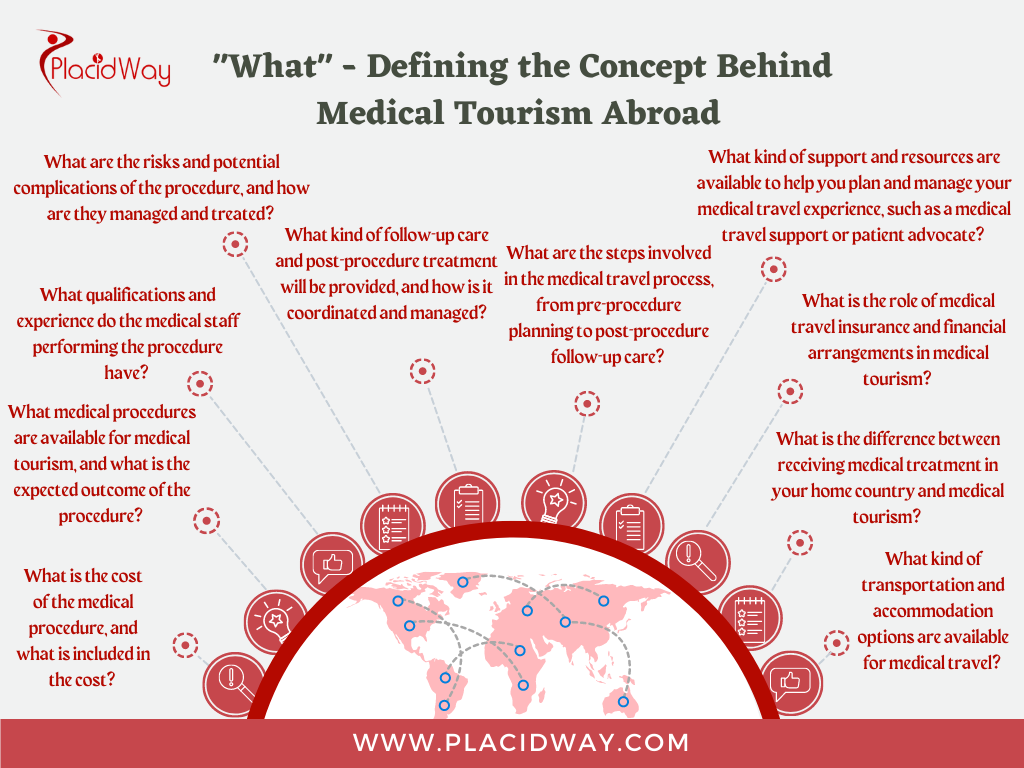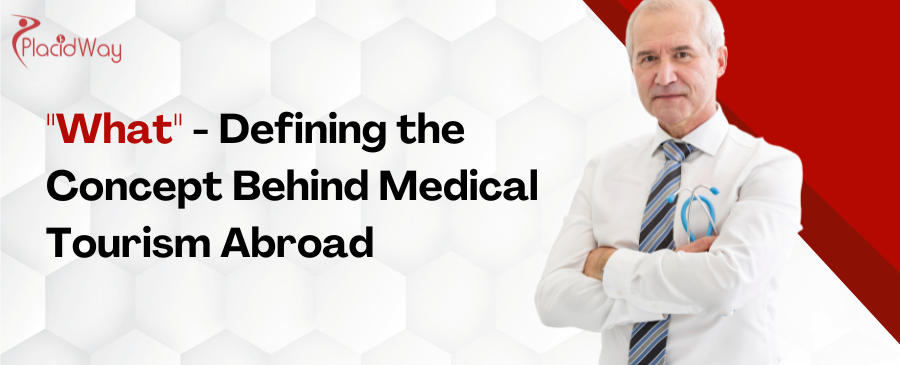Part 5 of Series: Answering the Top 100 Questions of International Patients in Medical Tourism
The “What” of medical tourism is critical to understand the demands as well as what is important to patients seeking medical travel. This guide will provide you with what information you need to help your patients make informed decisions about medical tourism abroad.

What medical procedures are available for medical tourism, and what is the expected outcome of the procedure?
There is a wide range of medical procedures available for medical tourism, including cosmetic surgeries, dental treatments, fertility treatments, orthopedic procedures, cardiac surgeries, and cancer treatments, among others. The demand of the procedure depends on the regions where patient is from and what their personal drivers are. For example customers from North America will be seeking cheaper elective procedure which are not covered by insurance, while people from Africa maybe looking for procedures which are critical care where they seek higher skills and technology.
The expected outcome of each procedure varies depending on the patient's individual circumstances and the type of treatment they receive. However, the goal of medical tourism is to provide patients with quality medical care and positive treatment outcomes that are comparable to or better than those available in their home country, often at a lower cost. It's important to note that the success of any medical procedure depends on various factors, such as the patient's health condition, the expertise of the medical team, and the post-treatment care provided.
What is the cost of the medical procedure, and what is included in the cost?
The cost of a medical procedure in medical tourism varies depending on the type of treatment, the location, the facility, and other factors. However, in general, medical procedures in medical tourism are often significantly less expensive than in the patient's home country.
The cost usually includes the procedure itself, pre-operative and post-operative consultations, hospital stay, medications, and sometimes, additional services such as accommodation, transportation, and translation services. Some medical tourism providers offer packages that include all the necessary services, while others offer a more a la carte pricing model, where patients can choose the specific services they need. It's important for patients to thoroughly research and understand the cost and what is included in the price, as well as any potential additional fees or charges that may not be covered.
What qualifications and experience do the medical staff performing the procedure have?
The qualifications and experience of medical staff who perform procedures in medical tourism vary depending on the country, facility, and the specific medical procedure. In general, reputable medical tourism providers aim to hire highly qualified and experienced medical staff, often with international training and certifications, to ensure the quality and safety of their services.
Before choosing a medical tourism provider or facility, patients are doing more research on the qualifications and experience of the medical staff involved in their treatment. Providers should be able to readily provide this information to patients proactively to build trust. Patients can also look for accreditations or certifications from recognized international organizations, which can serve as an indicator of the quality of the medical staff and the facility. Additionally, patients can ask for references or read reviews from previous patients to get a better understanding of the medical staff's qualifications and experience. Having this information readily available is critical to winning international customers.
What are the risks and potential complications of the procedure, and how are they managed and treated?
Every medical procedure carries some level of risk, and it is important to discuss these risks with the patient before the procedure. Patients should be informed about the potential complications of the procedure and how they will be managed and treated if they occur. It is essential to have a plan in place for managing any complications that may arise during or after the procedure.
What kind of follow-up care and post-procedure treatment will be provided, and how is it coordinated and managed?
The kind of follow-up care and post-procedure treatment provided in medical tourism varies depending on the type of treatment and the medical tourism provider or facility. Reputable providers are those who provide clear information on the post-procedure care plan, including any necessary medications, rehabilitation programs, and follow-up appointments.
It's important for patients to fully understand the post-procedure care plan and the expectations for their recovery before undergoing treatment. Patients should also ask for a detailed breakdown of the costs associated with post-procedure care and ensure that they have adequate resources to cover any necessary follow-up appointments, medications, or rehabilitation programs. Additionally, patients should ensure that they have a clear communication plan with their medical provider or facility to address any concerns or complications that may arise during the post-procedure recovery period.
What kind of transportation and accommodation options are available for medical travel?
Transportation options may include airport pickup and drop-off, ground transportation between the airport and the facility, and transportation to and from medical appointments. Depending on the location, some providers may offer a dedicated transportation service, while others may rely on local transportation options such as taxis or public transportation. Arranging such services for international customers helps in creating an exceptional medical tourism experience.
Helping customers arrange accommodation options may include on-site lodging, nearby hotels or apartments, or even medical tourism-specific recovery centers. Some providers may offer packages that include both transportation and accommodation, while others may offer them separately.
What are the steps involved in the medical travel process, from pre-procedure planning to post-procedure follow-up care?
The steps involved in the medical travel process can vary depending on the provider and the specific medical procedure. However, the following are general steps that patients can expect to go through when seeking medical treatment abroad:
- Pre-procedure Planning: Patients will research medical tourism providers and choose one that best meets their needs. They will communicate with the provider to obtain information on the medical procedure, costs, and other necessary details. Patients may also need to obtain medical records, visas, and travel documents.
- Travel Arrangements: Patients will make travel arrangements, which may include transportation, accommodation, and itinerary planning. They may need to obtain travel insurance and arrange for local transportation during their stay.
- Arrival and Consultation: Patients will arrive at the destination and meet with the medical staff for a consultation, which may include a physical examination, medical history review, and diagnostic tests. The medical staff will determine whether the patient is fit for the planned procedure and provide instructions for pre-operative preparation.
- Procedure: The medical procedure will take place as scheduled. Patients will undergo the procedure under the supervision of the medical staff.
- Recovery: Patients will be monitored and receive post-operative care, including pain management, wound care, and medication. The medical staff will provide instructions for post-procedure care and rehabilitation.
- Follow-up Care: Patients will attend follow-up appointments as scheduled to monitor their progress and ensure that their recovery is proceeding as planned. The medical staff will provide instructions for managing any complications or issues that arise.
- Return Home: Once the medical staff has determined that the patient is fit to travel, the patient will return home. Patients may require additional post-procedure care at home, which may involve coordination with local medical professionals.
What is the role of medical travel insurance and financial arrangements in medical tourism?
Medical travel insurance and financial arrangements are important considerations for patients engaging in medical tourism. Medical travel insurance can provide coverage for unexpected medical expenses, complications insurance, travel disruptions, and other unforeseen circumstances that may arise during the medical travel experience. Patients should be provided with information about the different types of medical travel insurance available, as well as any financial arrangements required, such as deposits or payment plans. Some patients may need financial loans or alternative financial arrangements.
What is the difference between receiving medical treatment in your home country and medical tourism?
Receiving medical treatment in your home country may be more convenient, but it may also be more expensive and have longer wait times. Medical tourism can offer lower costs, shorter wait times, access to specialized procedures, and the opportunity to combine medical treatment with a vacation. Patients should be provided with information about the differences between receiving medical treatment in their home country versus medical tourism destination, so they can make an informed decision about their medical care. Providers should be able to comparative data and justification why they are the best to provide care in the destination.
What kind of support and resources are available to help you plan and manage your medical travel experience, such as a medical travel support or patient advocate?
Providers should work with medical tourism ecosystem to make many resources available to help patients plan and manage their medical travel experience. This ecosystem of medical tourism resources could include medical travel agencies, patient advocates, and many online resources. Patients should be able to access information about these resources, as well as any recommendations or referrals to reputable providers in the area. It is important to support patients throughout their medical travel experience to ensure a successful and positive outcome.
Understanding the concept of medical tourism is essential in helping patients make informed decisions about seeking medical care abroad. Medical tourism offers a wide range of procedures, including cosmetic surgeries, dental treatments, fertility treatments, orthopedic procedures, cardiac surgeries, and cancer treatments, among others, with expected outcomes that are comparable to or better than those available in the patient's home country.
It is important to consider the costs, qualifications and experience of medical staff, potential risks and complications, post-procedure care, transportation and accommodation options, medical travel insurance, and the differences between receiving medical treatment in the patient's home country and medical tourism.
Providers should also make available support resources to help patients plan and manage their medical travel experience, such as medical travel agencies and patient advocates. With proper planning, coordination, and communication, medical tourism can provide patients with affordable, accessible, and specialized healthcare options and a positive medical travel experience.
Join PlacidWay now and experience world-class medical care abroad!


